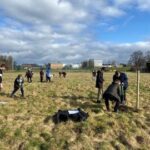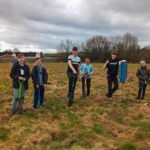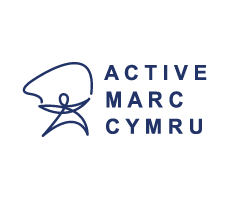Students Plant Heritage Fruit Trees on School Grounds
Category : Events

 Students at a Ysgol Clywedog have been planting ancient varieties of fruit trees in an area of the school grounds as part of a local heritage growing project.
Students at a Ysgol Clywedog have been planting ancient varieties of fruit trees in an area of the school grounds as part of a local heritage growing project.
Staff at the school approached the team at Brymbo Heritage Orchard a year ago to discuss the potential of working together on the school’s Tyfu (Grow) project, which has been developed by the Eco-Action Taskforce Group.
On a visit to the school, the potential of creating a heritage orchard was discussed, along with apple juicing and learning how to care for trees. After hearing about the plans, the students were excited to get involved and Brymbo Heritage Orchard donated twenty apple and plum trees to kickstart the project.
Last year, in the same field, the Eco-Action Taskforce Group created an allotment and planted two hundred and fifty trees donated by the Woodland Trust.
Nicholas Brown, head of geography, said: “It has been great to start working with the Brymbo Heritage Orchard and we are grateful for their support with this exciting project.
“We should be harvesting fruit in a couple of years’ time so this is a long term partnership and project for students in school, and those who have not joined yet. We did not choose cider varieties as we don’t want to produce alcohol, but we are really looking forward to juicing and baking with the fruit.
“After only one year, we are already seeing a boost in the biodiversity in the area and this will increase further once these new fruit trees begin to establish. I think it is so important for young people to have an opportunity to get hands on experience through projects such as this, where they can learn about growing food and the benefits this can bring to them and the environment.”
Hana McGreary, a design technology teacher, organised the planting day. She said: “It was a very productive morning and, with the help of students from key worker families, some of whom are Eco-Taskforce members, we successfully planted eighteen heritage apple trees and two plum trees. The students worked well as a team to accurately space out the trees, prepare the ground and position the support posts. It was a really enjoyable day, and I would like to thank everyone for their hard work.”
Daisy Pittaway, year 9, was one of the students who took part. She said: “Even though it was hard work planting the trees, it was great fun! I loved being able to use the big tools to dig holes and turn over the soil. When the trees start to grow, I will know that all the hard work that was put into planting them was so worthwhile. Knowing that I am contributing to helping the environment is extremely rewarding for me. Our Eco Club has been working really hard on different projects and I feel proud to be involved with it.”
The school’s Tyfu (Grow) project has already achieved numerous accolades since it started in September 2019, including: the Woodland Trust Green Tree Gold School Award; Jane Goodall’s Roots and Shoots Silver Award; The Royal Horticultural Society (RHS) School Bronze Award and the Eco-Schools Bronze Award.
The environmentally astute students also scooped the top International Collaboration prize in the final of the International Collaboration category of the Young Reporter for The Environment (YRE) Competition, in conjunction with their partner school, Colegio Enriquez Soler in Melilla in Spain. The students’ winning video entitled ‘Plastic Waste – An Intercontinental Problem’, highlighted the damaging and long-term impact of single use plastics on the environment.
Hoping to defend their title, this year the students have once again teamed up with students from Colegio Enriquez Soler as well as two schools in Beirut, Lebanon to produce a video about swapping single use plastic for reusable materials.
Plans are also in place to launch a whole school International Eco-Week later in the year where students will be doing joint activities with the schools in Lebanon in every subject, including joint assemblies, cooking traditional Welsh and Lebanese foods, sharing music and art, measuring air quality, and comparing the two areas.









